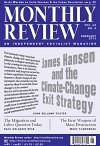Volume 64, Issue 09 (February)

For a long time now orthodox economics has been hindered by its extreme irrealism—a refusal even to attempt a realistic theoretical understanding of how modern capitalism functions. The shift to using fanciful assumptions to explore largely minor issues, following a brief Keynesian moment in the post-Second World War era, has been in many ways self-reinforcing. Once fundamental characteristics of the capitalist economy such as labor exploitation, accumulation, built-in inequality, monopoly power, rent-seeking behavior, technological change, and the tendency to stagnation were removed from the analysis—as a result of an ideological process of system-rationalization—there was little recourse but to fall back in successive stages on more and more abstract models based on increasingly purified notions of individual rationality.… Nevertheless, the deepening crisis of today’s monopoly-finance capital has given rise to a new era of questioning within the economics profession, and some top-tier neoclassical economists are now struggling—though hindered at every step by their own training and inclinations—to recapture knowledge long abandoned. | more…
The world at present is fast approaching a climate cliff. Science tells us that an increase in global average temperature of 2°C (3.6° F) constitutes the planetary tipping point with respect to climate change, leading to irreversible changes beyond human control. A 2°C rise is sufficient to melt a significant portion of the world’s ice due to feedbacks that will hasten the melting. It will thus set the course to an ice-free world. Sea level will rise. Numerous islands will be threatened along with coastal regions throughout the globe. Extreme weather events (droughts, storms, floods) will be far more common. The paleoclimatic record shows that an increase in global average temperature of several degrees means that 50 percent or more of all species—plants and animals—will be driven to extinction. Global food crops will be negatively affected. | more…
Nothing makes me more hopeful than discovering another human being to admire. My wonder at the life of Celia Sánchez, a revolutionary Cuban woman virtually unknown to Americans, has left me almost speechless. In hindsight, loving and admiring her was bound to happen, once I knew her story. Like Frida Kahlo, Zora Neale Hurston, Rosa Luxemburg, Agnes Smedley, Fannie Lou Hamer, Josephine Baker, Harriet Tubman, or Aung San Suu Kyi, Celia Sánchez was that extraordinary expression of life that can, every so often, give humanity a very good name. | more…
It is impossible to disentangle the migration and labor question today without a deep understanding of the nature of contemporary capitalism, namely, neoliberal globalization. One of the main features of the new global architecture…is the assault on the labor and living conditions of the majority of the global working class, and in particular the migrant workforce, which is among the most vulnerable segments of this class. This essay will analyze some key aspects of the system that contemporary migration is embedded in, with emphasis on the process of segmentation and the growing precariousness (precarization) of labor markets worldwide. | more…
When the real estate market was building momentum during the 2000s, [new types of restructured, risk-based financial instruments] looked like a free lunch and insurers could pocket the insurance premium without ever being called in to make up for losses. However, when the market reversed in 2006, the payday came: some insurers lost heavily, others went bust, and a few, such as AIG, were bailed out. … By the end of the cycle, we had learned about the pro-cyclical nature of ratings-based structured products and the dangers of the new food chain. Hedge fund manager George Soros called Credit Default Swaps “weapons of mass destruction.” We had, many believed, been defeated by novelty. Or had we? Many think that subprime products are new, and that the use of ratings to structure financial instruments and so-called Credit Default Swaps (CDS) are a recent invention permitted by advances in modern finance. They ought to study the history of Levy Maybaum, a man who lived in New Jersey in the late nineteenth century and invented the first CDS. | more…
Questions and Challenges for John Bellamy Foster
Zhihe Wang’s article “Ecological Marxism in China,” which appeared in the February 2012 Monthly Review, demonstrated that Chinese interest in ecological Marxism has grown rapidly over the past two decades…. The practical, political, and theoretical reasons for its success include: pressing environmental issues facing China; the government’s call for ecological civilization; the many characteristics that ecological Marxism shares with traditional Chinese Marxism; and the support it has provided for China’s environmental movement. Numerous works by Western scholars, including Ben Agger, John Bellamy Foster, William Leiss, and James O’Connor, have recently been translated into Chinese. …In comparison [to the others], John Bellamy Foster’s ecological Marxism was introduced relatively late. But recently it has drawn the greatest attention from Chinese Marxist scholars…. Our purpose here is to elicit a response from Foster on some of these developments in Chinese thought. | more…
A Brief Response to Chinese Scholars
I would like to thank Zhihe Wang, Meijun Fan, Hui Dong, Dezhong Sun, and Lichun Li for doing so much to promote a global dialogue on ecological Marxism by summarizing some of the insights and concerns of Chinese scholars in this area, focusing in this case on my work in particular. The various questions, challenges, and critiques raised in relation to my work and that of related scholars are all, I believe, of great importance to the development of theory and practice in this area. I am therefore providing a brief set of responses to the problems raised, which I hope will be helpful in the further promotion of this global dialogue on ecology and Marxism. | more…
